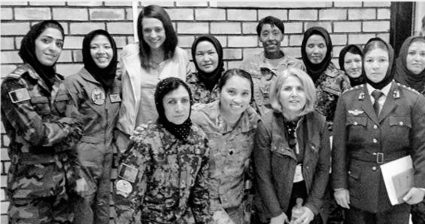Changing the World is Possible, through Rotary
 Through a Google search, I learned Rotary was an international service organization.
Through a Google search, I learned Rotary was an international service organization.Intrigued, I applied for the scholarship and made it to the district interview, where I was asked what I wanted to do, really do.
The question took me by surprise. Unsure how to answer, I stuttered that I hoped to change the world someday. I remember looking at the floor thinking, how far-fetched.
Bethany Lerch, right, takes notes while speaking to a female
attendee during a national mine awareness conference in Kabul.
I knew little about Rotary eight years ago when my former high school counselor encouraged me to apply for an Ambassadorial Scholarship. He was retired, but still active in Rotary, and knew a masters was my next step. At the time, I had just graduated from the University of Wisconsin Oshkosh and knew I needed to go to graduate school. But where and how?
Through a Google search, I learned Rotary was an international service organization. Intrigued, I applied for the scholarship and made it to the district interview, where I was asked what I wanted to do, really do. The question took me by surprise. Unsure how to answer, I stuttered that I hoped to change the world someday. I remember looking at the floor thinking, how far-fetched.
Less than a week later, I received the call that I had been selected. What if, I wondered, my acceptance had to do with wanting to “change the world” someday?
The University of Saint Andrews was my graduate school home. I pursued Terrorism Studies in hopes of better understanding the phenomenon that was killing so many, so often. In spring, two faculty members took me and a dozen classmates to the Middle East to see the context of that particular enduring conflict for ourselves. It was crushing.
I zeroed in on Afghanistan with my research, marveling at the country and investigating its history of, and tendency toward, violence as a means to an end. If ever there was a country that baffled historians and social scientists, Afghanistan is it. From the Anglo-Afghan wars to the Taliban to Al Qaeda, Afghanistan remains a bit mysterious.
It took four years of independent work and international travel before I finally made it to Afghanistan as a trainer on Gender Integration and Resource Management with the U.S. government. My job was to meet incoming Coalition personnel and teach them about the overall mission, as well as the country’s political and cultural terrain.
I arrived believing in making a change, forging ahead with equal rights for women, and telling others about doing the same. Less than a month later, a young Afghan woman named Farkhunda was brutally killed by a mob in downtown Kabul. Big questions set in. Mostly I wondered if we had the right approach: What if it was all too much, too soon?
My second job in Kabul took me from NATO headquarters into the city, where I worked with Afghan consultants to help their countrymen in the Ministries of Defense and Interior. Our team included strong Afghan women. Zahra was one of them. She demonstrated competence, courage, and commitment to rebuilding her country.
 Lerch, third from left in rear, with her Coalition colleagues and women in the Afghan military.
Lerch, third from left in rear, with her Coalition colleagues and women in the Afghan military.Zahra explained that she hoped to attend graduate school abroad. Like my guidance counselor before me, I told her about Rotary scholarships. Unfortunately, when we turned to Afghanistan-based Rotary groups, we found them unable to facilitate the global grant application.
As an alternative, I turned back to my hometown Rotary clubs in Oshkosh, Wisconsin, USA. Would they be willing to help Zahra? They were.
The Afghan Education Project kicked off with a small group: representatives from two Oshkosh Rotary clubs, folks from the University of Wisconsin campus in Oshkosh, and I (in Kabul). The university waived out-of-state tuition; a Rotary club provided the sponsor letter to the U.S. Embassy in Kabul; and Rotarians donated to fund the cost of Zahra’s in-state tuition for a graduate degree in Educational Leadership and Policy.
Now in her second semester, Zahra has achieved all A’s. She is gainfully employed on-campus, for which she receives free room and board and meals. She is researching more about women’s access to education in Afghanistan, specifically how ethnicity and regional cultural norms impact their access. Upon her return to Afghanistan, she plans to work in educational policy. She’d like to integrate more literacy components, diversity lessons, and tolerance best-practices into the national curriculum.
I’ve always suspected that changing the world is possible. Rotary helped change my world, then did the same for Zahra. Just as Rotary makes a difference through its global organization and local presence, so, too, will Zahra’s future leadership in Afghan education make a difference for countless young students in Kabul and beyond.
Bethany Lerch is the founding President of Rotaract Oshkosh, graduate of the University of Saint Andrews, and former Coalition Military Advisor in Kabul, Afghanistan. For more information on the Afghan Education Project, including how to support it, visit www.able-to.org.
